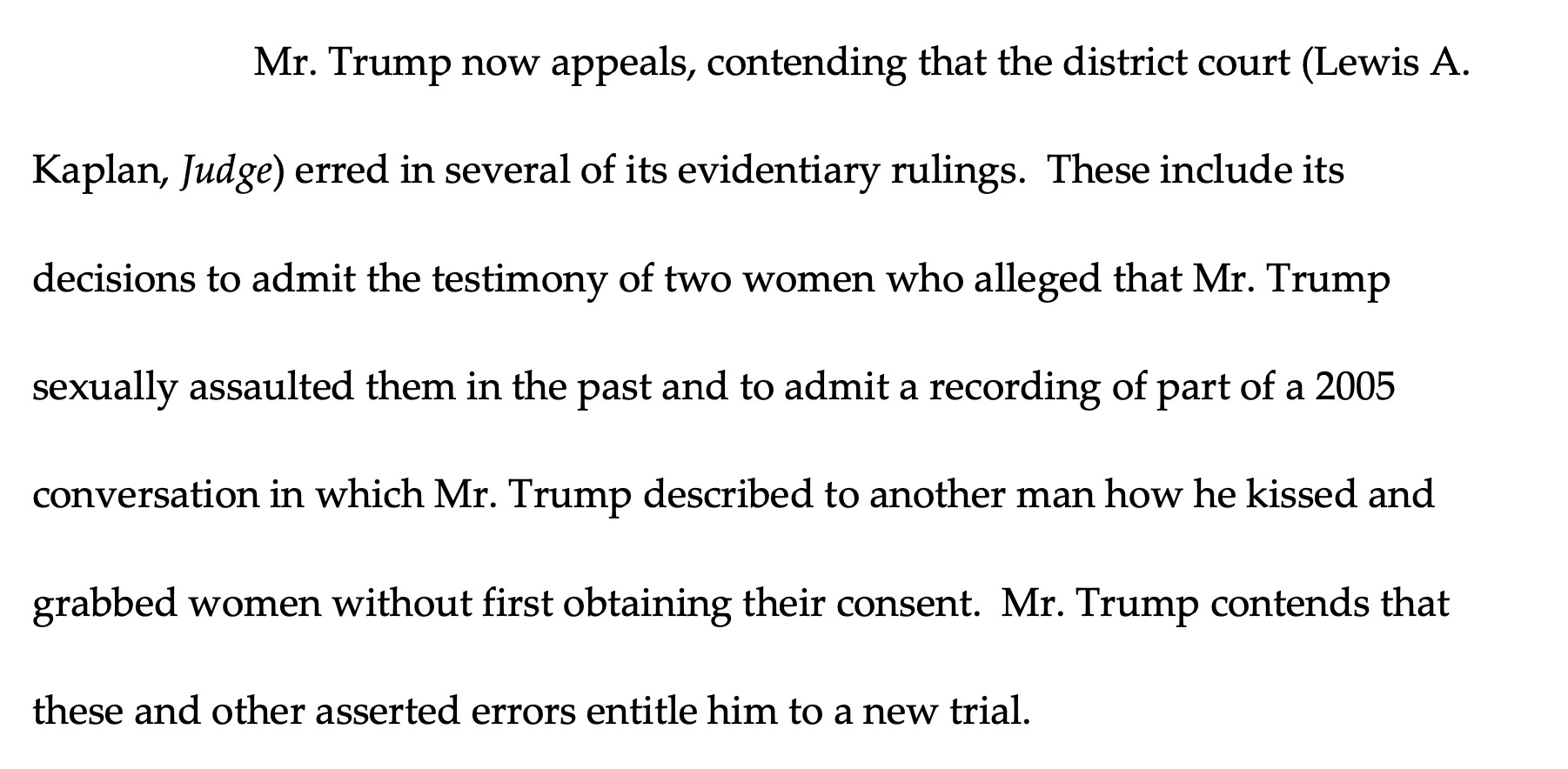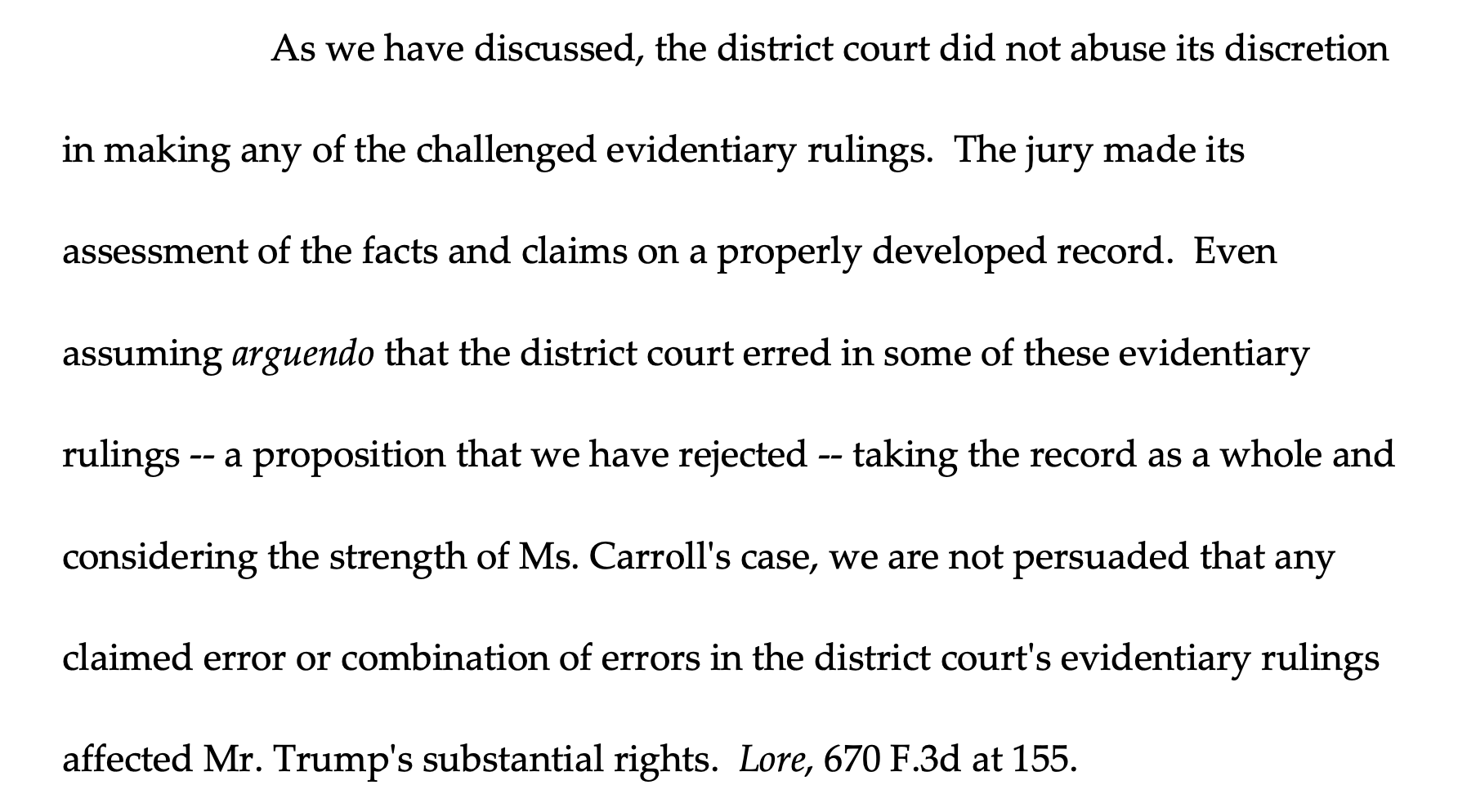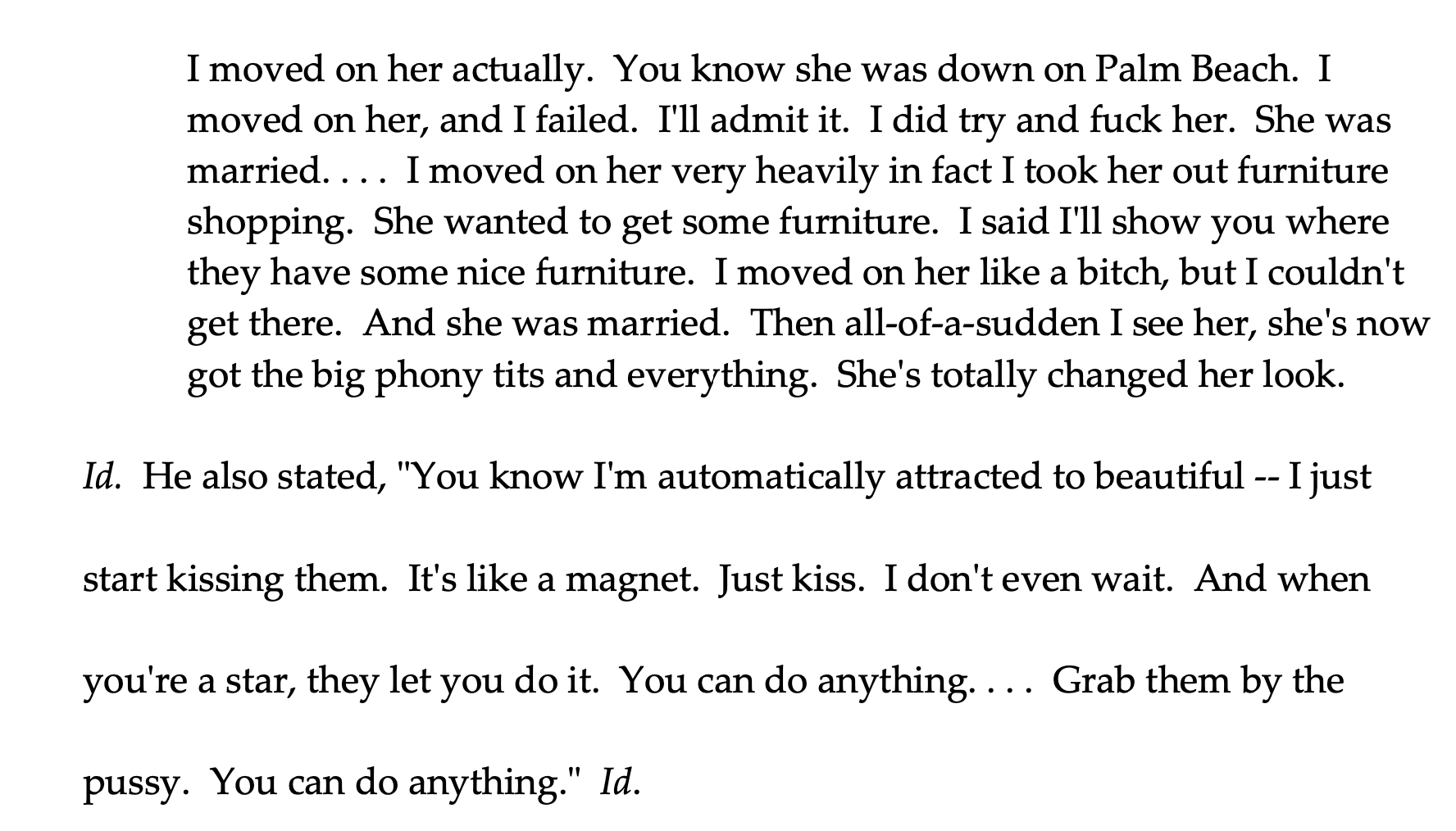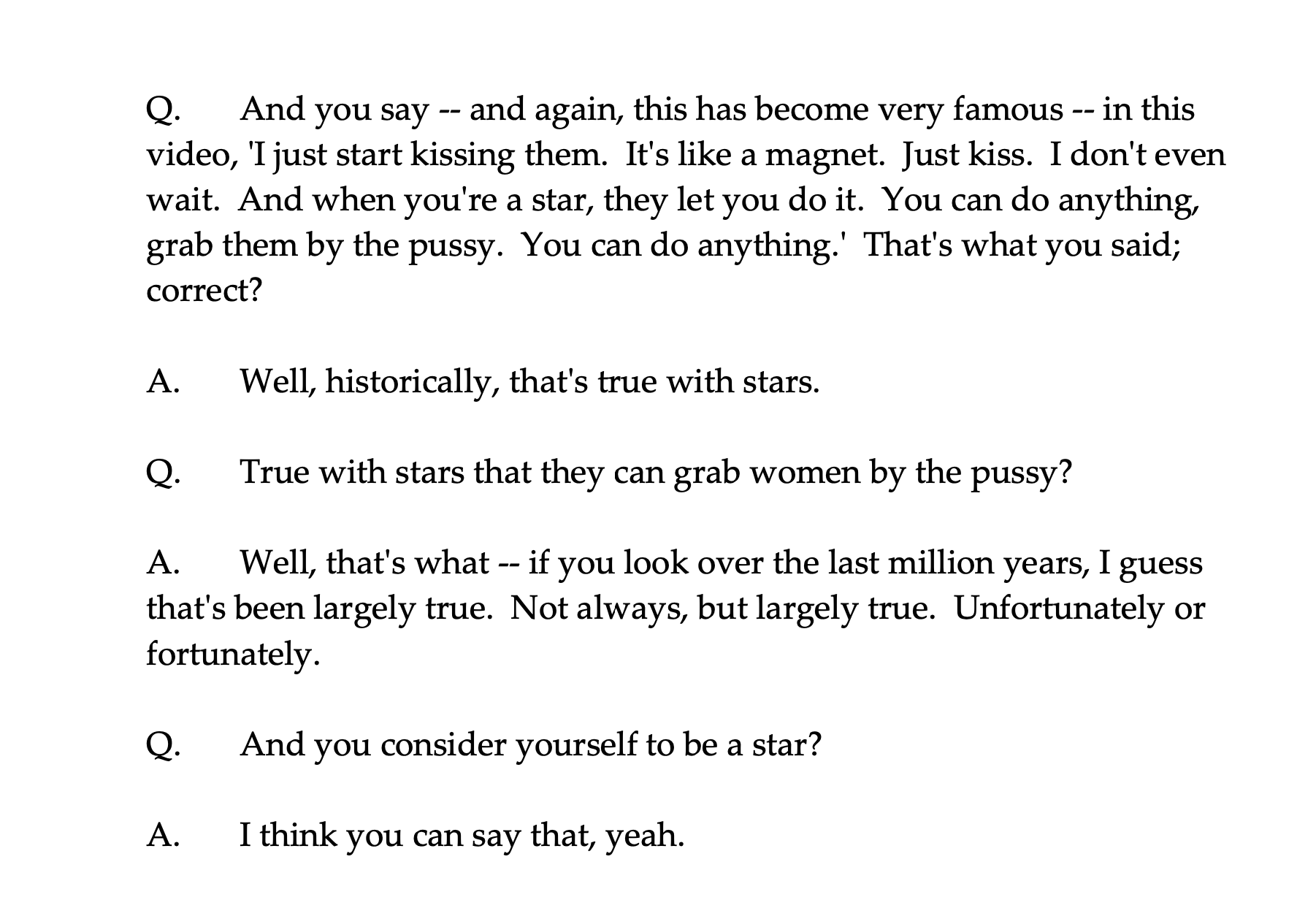Tuesday, December 31, 2024
Monday, December 30, 2024
TRUMP SEXUAL ABUSE VERDICT AFFIRMED
After an inexplicable delay, the Second Circuit Court of Appeals issued its opinion, affirming the jury verdict in the first of E. Jean Carroll’s two defamation cases to go to trial against Donald Trump (for those of you who followed closely, you’ll recall this was actually “Carroll II,” the second of the cases Carroll filed, but it made it to trial first for reasons discussed here.)
At the start of it’s 79 page opinion, the court recites that “after a nine-day trial, a jury found that plaintiff-appellee E. Jean Carroll was sexually abused by defendant-appellant Donald J. Trump at the Bergdorf Goodman department store in Manhattan in 1996. The jury also found that Mr. Trump defamed her in statements he made in 2022. The jury awarded Ms. Carroll a total of $5 million in compensatory and punitive damages.”
The Second Circuit’s decision today does not involve the other case, where Carroll was awarded $83.3 million by a second jury. That happened in large part because Trump, after losing the first go-round, was simply incapable of letting it drop and continued to defame Carroll, including in a CNN town hall the day after the $5 million verdict.
The most important part first: The court ruled in Carroll’s favor, finding that Trump failed to show that the trial court committed errors that entitled him to a new trial. This is the final word in the Second Circuit’s view. Trump can ask the full court to rehear the case en banc, which it is unlikely to do. Or, he can petition the Supreme Court for certiorari review. But the Supreme Court doesn’t have to take the case and, in fact, it would be surprising if it did.
If that topline from the case is enough for you, stop here. But if you want more, I’ve read the entire opinion, and I have some hot takes for you. Yes, it’s a lot of legalese, but I think you’ll find it worth your time. (And if you’re done here, do skip down five paragraphs and read the two starting with “In it’s recitation of the case,” because whether it’s intentional or not, the court has something to say about why E. Jean Carroll didn’t come forward for years.)
Keep in mind that as the court is careful to say, in an appeal like this, it’s required to view the evidence in the light most favorable to the plaintiff—that’s E. Jean Carroll—so the legal assumption the court proceeds with is that her version of the facts is accurate. This is the legal device used in an appeal of this nature: the Court of Appeals is evaluating the verdict and whether it can stand, assuming Carroll’s version of events, which the jury accepted, is true. Even with that in mind, the court’s recitation and evaluation of the evidence is a timely reminder of who the next president of the United States that is worth reviewing, even if you’re already thoroughly disgusted.
This appeal is primarily about whether the trial court erred when it admitted certain types of evidence at trial (see below), and in our legal system, those decisions are committed to the sound discretion of the trial judge and are only reversed if there is an abuse of that discretion. The Court of Appeals put it this way, “We accord ‘great deference’ to a district court, however, in ruling ‘as to the relevancy and unfair prejudice of proffered evidence, mindful that it sees the witnesses, the parties, the jurors, and the attorneys, and is thus in a superior position to evaluate the likely impact of the evidence.’" It is the trial court’s unique opportunity to eyeball the evidence and the witnesses during trial that puts it in the best position to make these calls.
 |
There is nothing unique or novel in this case beyond the identity of the defendant. There is nothing to take it beyond the realm of the thousands of cases where decisions made by the courts of appeals across the country stand as a final decision every year. This decision should be the end of this case. If the Supreme does decide to take it, that, even in this era, would be a shocking abuse and indication of special treatment for Trump.
It takes four Justices votes for the Court to agree to hear a case. Of the 7,000-8,000 cert petitions filed each term, the Court typically hears about 80 of them. Fact based questions about whether a trial judge abused their discretion in admitting evidence that demonstrates intent, motive, pattern of behavior, and so forth—evidence that is frequently used in cases—typically doesn’t rise to that level.
In its recitation of the facts of the case, the court seems to grasp something that Donald Trump never did, and that society at large often misses. Trump claimed Carroll made the whole thing up, that she wouldn’t have waited so long to tell the story if it was true. Of course, Carroll did tell two of her closest friends at the time, but she never went to the police. One of her friends had cautioned her: Trump was too powerful; it would end her career. It’s an all too familiar story for women.
Here is the court’s take: “While conducting interviews for a book that she was writing in 2017, the accounts of assaults perpetrated by Harvey Weinstein came to light and received nationwide attention. As a consequence of the many women who came forward to report their experiences of sexual assault, Ms. Carroll finally decided to share more broadly what Mr. Trump had done to her in 1996.” Me too was a watershed moment for so many women. It was for E. Jean Carroll too. In an era where women have faced taunts of “your body, my choice” in the wake of the election, we might want to stay focused on what women have gained—and lost—in recent American history.
In discussing the trial judge’s decision to permit Carroll’s lawyer to put on evidence of other alleged sexual assaults committed by Trump, the Court of Appeals writes, “Rules 413 and 415 permit a jury to consider evidence of a different sexual assault ‘precisely to show that a defendant has a pattern or propensity for committing sexual assault.’” They continue, “Congress ‘considered knowledge that the defendant has committed [sexual assault] on other occasions to be critical in assessing the relative plausibility of sexual assault claims and accurately deciding cases that would otherwise become unresolvable swearing matches.’ … ‘[T]he practical effect of Rule 413 [and Rules 414 and 415] is to create a presumption that evidence of prior sexual assaults is relevant and probative’ in cases based on sexual assault.”
A trial judge has the ability to prevent a jury from hearing evidence of prior sexual assaults if the value of the evidence in proving the plaintiff’s case is outweighed by undue prejudice to the defendant. That doesn’t mean that any prejudice is enough to keep the evidence out—all good evidence offered at trial is prejudicial, in the sense that it helps prove that one of the parties did or said something that they are being sued for. The question is whether there is unfair prejudice.
The court relates the evidence Carroll’s lawyers used at trial and concludes that all of it was properly admitted:
Jessica Leeds was assaulted on an airplane by Trump in 1978 or 1979 after he had a flight attendant invite her to come sit with him in first class. Leeds testified, “he was trying to kiss me, he was trying to pull me towards him. He was grabbing my breasts, he was -- it's like he had 40 zillion hands, and it was a tussling match between the two of us. And it was when he started putting his hand up my skirt that that kind of gave me a jolt of strength, and I managed to wiggle out of the seat and I went storming back to my seat in the coach.” Leeds acknowledged the groping and patting women frequently endured in that era, but testified, “when somebody starts to put their hand up your skirt, you know they're serious and this is not good.”
Natasha Stoynoff testified that, in December 2005, she was a
reporter for People magazine on assignment at Mar-a-Lago to do a story about Trump and Melania’s one-year anniversary and the birth of Barron Trump. Donald Trump took Stoynoff to a room where he said he wanted to show her a painting. She testified, “I hear the door shut behind me. And by the time I turn around, he has his hands on my shoulders and he pushes me against the wall and starts kissing me, holding me against the wall.” Trump was interrupted when his Butler walked in, but he told Stoynoff afterward that they were going to have “an affair” and told her to remember what his second wife, Marla Maples, had said about him, “best sex she has ever had.”
The infamous Access Hollywood tape was played twice for the jury. In the recording, Mr. Trump states that he "moved on" a woman named Nancy "like a bitch" and "did try and fuck her." The first block below is what Trump says in the tape, as related by the court. The second one is Trump’s deposition testimony about it (the same deposition where he misidentified a photo of Carroll at the time as one of his second wife, Maples):
Here’s what the court has to say about this evidence adding up to show a pattern of sexual assault by Trump: “In each of the three encounters [Leeds, Stoynoff, and Carroll], Mr. Trump engaged in an ordinary conversation with a woman he barely knew, then abruptly lunged at her in a semi-public place and proceeded to kiss and forcefully touch her without her consent. The acts are sufficiently similar to show a pattern or ‘recurring modus operandi.’ … Moreover, the [Access Hollywood] tape was ‘directly corroborative’ of the testimony of Ms. Carroll, Ms. Leeds, and Ms. Stoynoff as to the pattern of behavior each allegedly experienced, and ‘the matter corroborated’ was one of the most ‘significant’ in the case -- whether the assault of Ms. Carroll actually occurred.” On the question of undue prejudice, the court concludes, “we also find that the other act evidence was not unfairly prejudicial, as the incidents in question were ‘no more sensational or disturbing’ than the acts that Ms. Carroll alleged Mr. Trump to have committed against her.” The jury was entitled to hear all of this evidence against Trump.
Trump also objects to areas the trial judge didn’t permit his lawyers to go into in front of the jury, including why she never DNA tested her decades-old dress and why she didn’t file a police report. Using the same standard, the Court of Appeals concluded the trial judge did not abuse his discretion when he excluded this evidence.
So there you have it. The next president of the United States of America. A timely reminder.
As I’m writing this, the opinion is still only available on Pacer, the U.S. Court’s ridiculously expensive documents system. Unfortunately, that means I can’t link to it now, but I’ll update as soon as it’s available publicly. Taxpayers fund the courts, and they are well-funded. There is no reason the document system shouldn’t be available free of charge to everyone—open courts, and all that.
We’re in this together,
Joyce
LOOP NORTH NEWS - WE NEED TO GET BACK TO BEING HUMANS, NOT SCREENS
  We need to get back to being humans, not screens In a city craving connection post-pandemic, the movie theater experience encapsulates a broader longing for shared, authentic human interactions amidst the isolating digital age. As venues decline, the quest for warmth and community grows. By Howard Tullman 29-Dec-24 – Don’t expect any rational adult to be returning to traditional movie theaters any time soon – if ever. Unless they’re dragged there by their pre-teen kids to watch the sixth sequel to some animated comic book story or some hyper-marketed and painfully bloated film version of a musical like Wicked, where you can spend some two-and-a-half hours watching what turns out to be only the first half of the story. Anything worth watching for more than 30 minutes today requires only the patience to wait for the streamed version and the prescience to have subscribed to the correct number of streaming services. That, or the utter laziness to have failed to have cancelled the bulk of those subscriptions for lack of use. No one ever said it better than Springsteen, complaining about “57 Channels (And Nothin’ On).” The same is true now that we’ve reached 570 channels. There’s no question that we spend more time jumping around from service to service and show to show than we do watching anything from start to finish. It’s just so very hard to convince yourself that the total time investment is worth your while. Why there’s nothing to share How sad and unfortunate, because in the old days there was nothing quite as powerful, inexpensive, and rewarding as the shared experience in a darkened theater where a rapt audience was engaged and enthralled in the film rather than snacking, sleeping, acting out, or exploring their mobile phones while imagining they were elsewhere. Boorish behavior, COVID-19, crime, crazy inflated ticket prices, filthy facilities, and a fortune for food also helped to kill the classic grand venues and the golden goose. Watching anything on the miniscule screens inside one of the dozen little boxes that make up the typical multiplex is akin to feasting on faux Italian cuisine at an Olive Garden. Most of the time, the movies today are more about popcorn and peanuts than the feature. Even if you never really thought that the movie crowd was actual company – just as “friends” on Facebook have nothing to do with authentic friendship – we still all miss the idea of gathering in some place with like-minded and well-intentioned folks to actively participate in a real-time physical experience.
Sporting events and rock concerts – if you’ve got four or five hours to commit – are as close as we come to a singular sensation that feels both reassuring and real. People show up, they share, and they care. Hello, loneliness, I think I’m gonna cry We’re all looking in the post-pandemic world for opportunities to escape the isolation, loneliness, and the pent-up unhappiness of being shut-in while being shut out. When you’re working alone at home, sitting in front of a computer screen and pretending that it’s “social,” and feeling that the world – if you believe the made-up images and lies online – is passing you by. In part, this longing to get back to the past is a melancholic and nostalgic fantasy, but it also reflects a critical migration that’s important for every business. We want to get out of our heads and re-enter the real world; we’re not sure where we’re going, but we’re certain that we won’t be returning to the lock-down and lock-ups of the recent past. Been there, never want to do that again. We’re moving along a continuum of demand and engagement, from the early days of texts and pictures through videos and TikTok and onward – some might say backward – toward a new era of experiential everything.
Because the critical component of the process is necessarily, but not exclusively, tactile rather than technical or mechanical, I don’t expect any mass market adoption of the VR goggles, glasses, headsets, or other devices that the tech bros are now flogging. That’s mainly because they’re not inclusive or truly immersive; if anything, they’re even more isolating and sterile than staring into a screen all day. Even the best ads for the new Meta Quest headsets make the user look like an idiot stumbling around a room, lost in a CG morass, or just punching widely into the air. Audit your business for its human quotient We most likely leaped far too quickly over the “experience economy” in many ways and now we need to find our way back for ourselves and for our businesses. Hat tip to my friend Joe Pine for his early work in this area. For reasons of speed, cost, and convenience, our technologies have sucked most of the joy and intimacy out of the basic services and interactions we rely upon daily. We’re slowly re-discovering that we miss the welcome, warmth, and comfort of the familiar, casual, and personal ways we used to behave with others – whether it was in a retail content, an entertainment venue, a medical facility, a school, or anywhere else. And we’ve reached a point where the solutions most likely need to be face-to-face rather than even side-by-side in a darkened theater. Every business needs to review and audit their front-line and front-of-house dealings with consumers, customers, and prospects to determine just how up close and personal – how warm and welcoming – their stores, offices, venues, and buildings presently are. Suffice it to say, for the moment, they’ll be surprised, if not shocked, at just how cold, foreboding, and sterile these environments have become and how unappealing they appear to the outside world. How automation dehumanized us without improving anything “Personal” banking is an easy and oxymoronic example. Shrinking their public-facing spaces, eliminating cash transactions and other services, removing tellers and substituting ATMs, and, of course, substantially stepping up their security have turned our neighborhood bank branches into harsh and intimidating places with a few humans caged behind bullet-proof glass and a bunch of now empty and unused offices gathering dust and awaiting the latest renovations into Capital One cafes and quasi-coffee houses. If you’re looking for a public place to camp out – and get out of the house – and Starbucks has clearly decided by shrinking their stores that they no longer want to be your workplace, I guess any port in a storm will do.
It’s hard to fake familiarity and feelings – a bank will never be your best buddy. Medical offices have mainly exchanged the old wads of paper forms attached to clipboards for tablets and iPads, kiosks, or mobile apps which are redundant, painfully long, and often indecipherable. They demand information such as prescription and medication lists from you that are never readily available, or days and dates of long past surgical procedures that have nothing to do with present concerns. Every office in the medical world is largely an island – for various regulatory and competitive reasons – and the computer companies that provide and support the world of electronic medical records absolutely hate the idea of the kinds of interoperability that would make all our lives easier. Here again, finding a helpful human – still hidden behind barriers of one kind or another – is a difficult task and one that most often makes you feel like you are an imposition rather than a patient seeking information, support, comfort, and care.
(The good news is that the fast-food giants are already bagging many of the new digital systems.) These machines stare back at us without warmth and are far more confusing, intolerant, and punitive of entry errors or order changes than even the slowest human team member. It’s hard to imagine that challenging and intimidating your customers is the best opening gambit for a successful visit and sale. But businesses have grown to trade off unpleasant customer experiences in exchange for speed, access, and convenience – not to mention cost cutting and automation – without appreciating that we are undermining our true connection with our clients and sacrificing long-term brand value and customer loyalty in the name of short-sighted efficiencies and savings. Savings which may not even be effective or worthwhile. As we face an increasingly uncertain future, it makes a lot of sense to take the time to look at the way things were. Maybe we need to go back to the one-on-one way we once treated each other to reach a more authentic, empathetic, and successful future.
|
Saturday, December 28, 2024
The Supreme Court is Part of the Oligarchy
The Supreme Court is Part of the Oligarchy
The corrupt, bought-and-paid-for Supreme Court is why Trump wasn't held accountable.
I’m not a lawyer, but usually, when the Supreme Court hears a case, they are supposed to rule on that specific case. Yet somehow, in two crucial cases about holding Donald Trump accountable for insurrection, the corrupt court went out of its way to decide on questions not before it, and create “a rule for the ages,” as Neil Gorsuch put it during oral arguments this past spring.
The first bomb they dropped to destroy accountability for Trump was their ruling overturning the Colorado Supreme Court on Section 3 of the 14th Amendment. The justices decided 9-0 that Colorado could not keep a federal candidate off the state ballot - but a 5-4 majority took it a step further by deciding that Section 3 of the 14th amendment is not self-executing; meaning Congress has to first pass legislation disqualifying Trump. An idea so wrong that even Amy Coney Barrett joined the liberal justices and objected to that part of the ruling in her concurrence.
The second bomb they dropped was the immunity ruling. Not only did they grant Trump presumptive immunity in the case before them, but they granted all presidents presumptive immunity, and took it a step further by disqualifying official acts from being used as evidence to prosecute unofficial acts.
But that’s not all! Rather than deciding which acts in the Trump case were subject to immunity, they kicked it back down to the lower court, teeing up a second interlocutory appeal on whatever the lower court ruled. That effectively added another year to the delay. Additionally, it would give the corrupt court another swing at the DoJ case on the second appeal, where I imagine they’d rip it apart once and for all. When all was said and done, they decided that they themselves would be the ultimate arbiter of rulings on official acts for criminal presidents while adding ridiculously long pre-trial appeals to the process.
That’s nothing compared to the official acts evidence part of the ruling. Again - so bad and so wrong that Amy Coney Barrett joined the liberal justices to disagree. The gist is this: let’s say you want to prosecute a president after he leaves office for accepting a million dollar bribe in exchange for an ambassadorship. And let’s say you have emails between the president and the potential ambassador explicitly stating “I will give you this ambassadorship in exchange for a million dollars.” This Supreme Court ruling says you can’t mention the appointment of the ambassador (the quo) while trying to prosecute the bribe (the quid). Absolutely bonkers.
These two rulings are the reason we can’t have nice things. That and Mitch McConnell failing to convict Trump of Insurrection after his impeachment. These decisions are the reasons Trump has not been held accountable. All because a bought-and-paid-for supreme court, funded by dark money with corporate interests before the court, needed to protect Trump from prosecution and accountability.
Were it not for the immunity ruling, Donald would have faced trial for his role in the insurrection in March of 2024. Would a conviction have made a difference in the election given he was already a 34-count convicted felon? I don’t know, but we would have had a trial were it not for the Supreme Court. The immunity ruling also contained a permission slip from Clarence Thomas in his concurrence for Aileen Cannon to dismiss the documents case, opining apropos of NOTHING that Jack Smith was probably appointed and funded improperly.
POOF. Both DoJ trials were scrapped from the pre-election calendar. But even if Trump had lost the election, there’d be a second interlocutory appeal of Judge Chutkan’s immunity determinations that would have gone all the way back up to the Supreme Court - adding at least a year to the trial calendar. Would the corrupt court have left Judge Chutkan’s ruling in place, allowing the case to go to trial? If you believe that, I have a luxury motor coach to sell you.
People have been trying to convince me that if Trump were indicted sooner, he would have gone to trial before the election and wouldn’t have been re-elected. For that to be true, you’d have to convince me that the dark money funded oligarchs on the Supreme Court would have been cool one time and allowed the trial to happen. You’d also have to convince me that people are fine electing a man convicted of 34 felonies, but not a man convicted of 38 felonies. I have my doubts.
Regardless, I will forever blame the billionaire-funded Supreme Court. They are part of the oligarchy, and were installed to dismantle democracy.
~AG


































